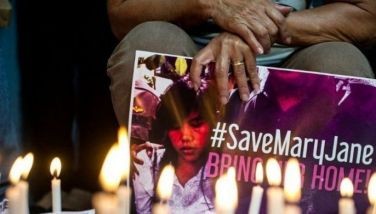Social media sites used for sex trade
MANILA, Philippines - The National Bureau of Investigation (NBI) revealed that some social media networks known for expanding and reconnecting friendship and in sharing social and professional activities have been used to offer sex for a fee by some Filipinas, including female college students.
Computer forensic expert and special investigator Joey Narciso said his department, the NBI-Computer Crimes Unit (CCU), has been working to shut down these pages in the social media, among them the popular website Facebook.
“It’s rampant in Facebook. They would create pages to advertise and promote prostitution,” Narciso told The STAR in a recent interview.
He scored the apparent lack of local laws that prevents
authorities from arresting or filing charges against these women or their “handlers” or “bugaw” (pimp).
“They asked me, if the Internet is being used in prostitution. I said no. Prostitution cannot be committed through the Internet or with the use of Internet. There are elements for prostitution. Number one element is that the woman (must demand) money or profit, or habitually engages in sexual intercourse for money or profit. The elements there should be habitual, sexual intercourse and money. In the Internet, there is no sexual intercourse unless you meet with them and have sex with them,” said Narciso.
“The social media is being used to ‘advertise or promote prostitution.’ But nothing has been violated here since we have no laws against promoting prostitution,” he added.
The NBI investigator is elated that the Cybercrime Prevention Act, whose implementation has been temporarily suspended by the Supreme Court, is being worked out to help solve cybercrimes in the country.
However, Narciso said if a handler is involved in the promotion of online sex, he or she could be charged with human trafficking.
“The handler could be charged with human trafficking, but not for prostitution per se in this case... there is no violation if they only advertise (online),” he said.
Narciso showed The STAR pictures of young women, some aged 18 to 19, who promote or advertise sex on Facebook. None of the pictures showed the women totally nude or displaying their private parts so they could keep operating the page, otherwise it would be shut down. They, however, wear skimpy clothing or show partly their undergarment to entice clients to have sex with them for a fee.
They use words like “toknat,” “PSP (personal service provider),” and “BJ,” among other coded words, to discuss the sex offer online.
Narciso also showed another website based in the United States, which includes details like the names and contact numbers of young Filipina women who advertise sex online.
As part of their operation, NBI agents create fake accounts and pose as members of these sites to monitor the activity, and eventually make arrests.
Narciso said it is easy to search these sites. He said some people recommend these to their friends or friends of friends. They find out about these websites through word of mouth, or through engaging in online chatting in these websites.
Sometimes messages are being published online asking to “sponsor” the girls being advertised. Some messages are posted in chats between friends online. While online, somebody would suddenly advertise a girl, saying “you could hire her for three hours for P3,000.” Sometimes locations are indicated as well as the time when and where you could meet the girl personally.
Narciso showed another website which engages in direct selling of young girls, either by the handler, or by the women themselves.
“The NBI has requested the regional office of Facebook in Singapore to take down these pages. But after only a few weeks, they began sprouting again. Some of the girls either knew they are in the Facebook pages, or sometimes their photos were grabbed without them knowing it,” he said.
“Once, a girl from a known university filed a complaint against Facebook because a picture showing her with her skirt slightly raised up and her underwear visible was uploaded without her knowing it,” he said.
He said the Facebook page was shut down and the pictures removed. But a few weeks later, they were back online.
Narciso said the general public still does not know about some of these websites, so the girls use Facebook to advertise themselves.
“We have a local contact in Singapore Facebook who follows up the shutting down of these pages. Two or three months ago we already requested these to be put down again,” he said.
He also asked the public to help them stop these activities by immediately reporting to the NBI any websites they found offering sex online.
- Latest
- Trending































